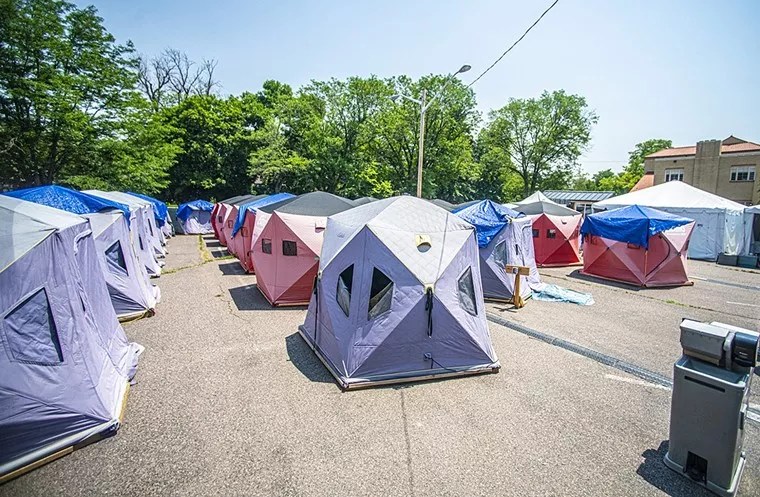
Evan Semon

Audio By Carbonatix
At its February 7 meeting, Denver City Council approved a $3.9 million allocation of federal COVID relief funds for Safe Outdoor Spaces, which will bolster the city’s safe-camping sites program.
“The city is daily demanding a solution to homelessness, and the SOS sites are one crucial response to that,” Councilwoman Jamie Torres said before council voted 11-1 in favor of the contract with the Colorado Village Collaborative, the nonprofit organization that runs the sites.
The CVC’s safe-camping sites program turns parking lots into outdoor communities, setting up uniform tents with centralized access to sanitation and services. The CVC currently operates three sites and plans to soon add another, running four concurrently for most of 2022 that would serve a total of 370 people. CVC hopes to get ninety of these individuals into permanent housing this year. In 2021, service providers were able to help transition 47 people from the sites into more stable housing.
Of the $3.9 million, 48 percent will go to staffing; 31 percent to startup costs, program supplies and maintenance; 11 percent to client support; and 10 percent to indirect costs. At full capacity, the CVC expects to have about eight staffers working at each site.
Some councilmembers had high praise for the safe-camping site model. “Where do we want people? I believe that the people of Denver overwhelmingly think that it’s better for people to be in a supportive, sanitary environment with some services to get on the road to stability than they do having people in unregulated encampments,” said Councilwoman Robin Kniech.
Although Paul Kashmann voted for the allocation, he expressed hesitation about the overall concept. “I’m not thrilled to death with safe outdoor spaces,” he acknowledged. “I wish we didn’t need them. People deserved dignified housing with a door that shuts and a place to store their stuff.”
Councilwoman Amanda Sawyer, who has consistently voted against funding safe-camping sites, was the lone “no” vote. “We all want to help people. We just have different opinions on how we should be prioritizing our spending,” she explained.
Although he was initially opposed to allowing safe-camping sites in Denver, Mayor Michael Hancock came around to the concept in the summer of 2020, and the first safe-camping sites were set up in Capitol Hill and Uptown in December 2020. Almost everyone who’s moved into a safe-camping site had been living in unsheltered settings, including on the streets.
“We’ve really found this to be a valuable tool to add to the spectrum of shelter services that help meet people where they’re at and meet those practical needs, and help folks to come inside to something that’s safer and meets them where they’re at,” said Angie Nelson, a deputy director in the Department of Housing Stability.
There’s been some neighbor opposition to almost every site, including administrative appeals and lawsuits. So far, none of those actions has resulted in a site being closed, but more hearings are on the schedule this month.
Council rep Chris Hinds noted that his district didn’t experience any issues when it hosted sites in the Capitol Hill area. And colleague Chris Herndon recalled: “I remember when there was a site coming to South Park Hill and neighbors were up in arms because they were unaware of what the site actually was and what it was going to do. We went to our worst thought about what could possibly happen. And then the site opened, and there were zero calls for service by police district two.”
The CVC, which is operating a site at Regis University in partnership with the St. Francis Center through the end of June, is currently looking for two more sites to pair with two sites that are slated to run through at least the end of the year: at a Denver Health-owned parking lot at 780 Elati Street and a City of Denver-owned parking lot at 3815 Steele Street.